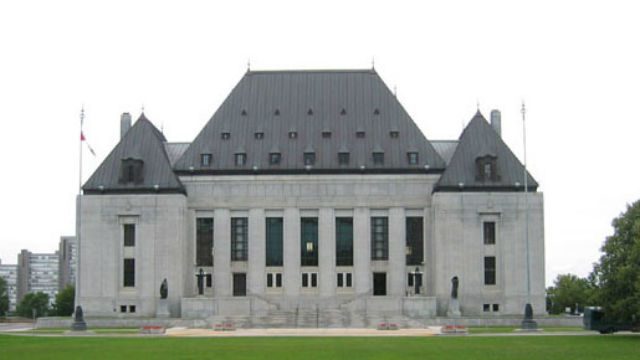SUMMARY
This is AI generated summarization, which may have errors. For context, always refer to the full article.

OTTAWA, Canada (UPDATED) – Canada’s supreme court on Friday, February 6 unanimously struck down a ban on doctor-assisted suicide for mentally competent adults suffering from an incurable disease, reversing a decision on the books since 1993.
The ruling was, however, suspended for one year to allow lawmakers an opportunity to enact new rules surrounding the divisive issue.
The court ruled that an earlier ban on the practice was too broad, saying it wrongly applied to more people than the small group it was meant to protect – “vulnerable persons from being induced to commit suicide at a time of weakness.”
It noted that making it a crime to assist another person who is “grievously and irremediably ill” in ending their own life had left the sick with only two options: suicide “often by violent or dangerous means,” or suffering until natural death.
“The choice is cruel,” the court concluded.
Nothing in the court’s ruling indicated that doctors would be compelled to take part in assisted suicide if asked by a patient.
“Physician-assisted death is the existential and moral issue of our time,” said Conservative member of Parliament Steven Fletcher.
Fletcher, who is a paraplegic, had proposed loosening the ban on doctor-assisted suicide last year, and said he looked forward to working to revise the rules.
Fletcher said he agreed with the court, but favors maintaining regulations to prevent abuses.
The ruling Tories will “take the time to thoughtfully review this very important decision,” Attorney General Peter MacKay said, recognizing that there is “a wide and obviously very emotional range of perspectives on this issue.”
It was not immediately clear if a new law would be proposed before or after Canada’s general election in October, or if doctor-assisted suicide would become an election issue.
The Canadian Medical Association (CMA) said it would consult with the government on a new framework.
The CMA “recognizes that there are rare occasions where patients have such a degree of suffering, even with access to palliative and end of life care, that they request medical aid in dying,” it said in a statement.
“We believe in those cases… that medical aid in dying may be appropriate.”
Court about-face
A legal challenge of the ban was brought by the families of two women in the western province of British Columbia who have since died, and was supported by civil liberties groups.
One of the women, Gloria Taylor, died of an infection after suffering from amyotrophic lateral sclerosis (ALS), also known as Lou Gehrig’s disease.
Taylor said she did not want to “live in a bedridden state, stripped of dignity and independence,” nor did she want an “ugly death,” according to trial transcripts.
The other woman, Kay Carter, traveled to Switzerland, where she was allowed to commit doctor-assisted suicide, saying before she died that she was terrified at age 89 of “dying inch by inch.”
The Supreme Court’s decision reverses its own 1993 ruling in the case of Sue Rodriguez, a pioneer in the fight for the right to die in Canada.
At that time, the court expressed concern about protecting vulnerable persons, but in its new ruling pointed to changed Canadian social values.
In the more than two decades since the original ruling, debate on the issue has not abated, with parliament voting down several motions seeking to decriminalize assisted suicide. (READ: Vatican thinker brands Brittany Maynard suicide ‘wicked’)
But recent polling shows a strong majority of Canadians – 85% – support the right to die.
Some form of assisted suicide is legal in Belgium, Luxembourg, the Netherlands and Switzerland, as well as a handful of US states including Oregon.
‘Tremendous victory’
“This is a tremendous victory for human rights and for compassion at the end of life,” Grace Pastine of the British Columbia Civil Liberties Association said outside the court.
“What this decision means is that Canadians who are suffering unbearably at the end of life will have a choice now, the choice to seek the assistance of a physician if their suffering becomes unbearable.”
She thanked publicly men and women “with serious diseases like terminal cancer, Huntington’s disease, and multiple sclerosis” who testified in favor of repealing the ban by sharing their “personal and heart-wrenching stories with this court.”
“This decision has come too late for many of them,” she said. “May they rest in peace and may their families find solace in knowing that this case is going to be their enduring legacy.”
There remains, however, fierce opposition to loosening the rules.
Amy Hasbrouck of the rights advocacy group Not Dead Yet said she is “alarmed” by the “naive” decision handed down by the country’s top court.
“This decision endangers the lives of lots of Canadians,” Hasbrouck said. “When you are vulnerable, you need protection.” – Rappler.com
Add a comment
How does this make you feel?
There are no comments yet. Add your comment to start the conversation.